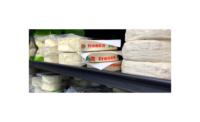A complete mozzarella ball processing line supplied by Priamo (part of the Della Toffola Group in Italy) is helping Neapolitan cheesemaker Fratelli Amodio supply overseas consumers with the same taste, texture, and quality expected from an Italian-made cheese, without the added export and transportation costs associated with manufacturing in Italy.
Priamo’s cutting-edge solution covers every stage of the mozzarella-making process. Comprising six individual systems, including automatic coagulation vats, drainage trolleys, a whey recovery system, cradle coagulation vats, ricotta trolleys, and salting cheese vats, it was designed to recreate the high-spec taste, presentation, and texture of traditional Italian mozzarella within a U.K. setting.
“Finding a local supplier of precision cheese-making equipment was crucial in helping us recreate authentically Italian, sustainably-produced mozzarella,” says Cesco Amodio, owner, and founder, along with his brother Henry Amodio, of Fratelli Amodio’s U.K. enterprise. “Priamo’s support is vital to the success of our new operation.”
Hygiene and flexibility
Initially designed to produce 1,500 kilograms of mozzarella per day, Priamo’s flexible, modular solution will enable Fratelli Amodio’s business to grow with demand while retaining a compact footprint. It also gives the cheesemaker the option to produce other specialist Italian cheeses such as Burrata, Stracchino, Montasio, Asiago and Caciocavallo and even hard cheeses such as Gouda and cheddar.
In addition to being flexible, it was imperative that the solution adhere to the strictest standards of hygiene to avoid contamination and preserve the product’s shelf life. Priamo’s range of equipment specified for Fratelli Amodio is ultra-clean and manufactured with food-grade stainless steel (meeting all EU food safety certification standards) to ensure it can withstand even the most robust cleaning and washdown regimes.
Sustainability gains
It also helps with the company’s sustainability agenda.
“Our new U.K. base is located on the Chew Valley Dairy Farm in Somerset,” explains Amodio. “Milk from the farm’s cows will be used to make the mozzarella, increasing the sustainability credentials integral to our brand. Rather than using plastic, our mozzarella will be packaged in glass jars — a unique offering that we are sure our climate-conscious customers will appreciate. To support our sustainability agenda, the equipment supplied by Priamo will help to reduce waste by eliminating human error, as well as being extremely energy efficient.”
In fact, Priamo’s equipment is intelligently designed to reduce its customers’ carbon footprint.
“Our solution will enable the customer to extract more final product from their raw material,” explains Stefano Berto, sales manager. “This will reduce the volumes of byproduct created and increase their yield. In addition, all our equipment has the option of automated cleaning-in-place technology, saving on water and energy consumption, as well as cleaning products. This has a positive environmental impact, as it reduces the load on effluent treatment and cuts power consumption while maintaining the highest standards of hygiene.”
Local support
In a bid to bypass Brexit-related costs, delays and bureaucracy, Fratelli Amodio approached a number of Italian equipment suppliers to help it set up a manufacturing base in the U.K., including Priamo’s parent company, the Della Toffola Group; an Italian-based international provider of processing and packaging machinery.
“Della Toffola came highly recommended to us by our Italian counterparts,” says Amodio. “Their team are extremely knowledgeable and helpful, and the price-to-quality ratio was impressive. But most of all, the combination of Italian machinery — in this case, the Priamo range — and local support was exactly what we were looking for.”
Recreating the Italian approach
For Berto, understanding the authentic Italian mozzarella production process was critical to delivering the right solution:
“The first step is to turn the milk into curd, for which we specified our coagulation vats,” he says. Made of food-grade-quality stainless steel for superior hygiene capabilities, they’re automated to provide precision temperature and cutting control.”
Inside the vats, the milk is pasteurized, agitated, and then coagulated before the solids (curd) are separated from the whey. To achieve this, the curd is transferred to a drainage trolley, where it’s left to mature. The trolley specified by Priamo consists of a tilting flat-bottomed tray featuring perforated sheet-metal grids, which enable the whey to successfully drain away, leaving the curd intact.
To create the elasticity for which mozzarella is renowned, the curd must then be stretched. Replicating the traditional manual process, the system supplied by Priamo comprises mechanical arms that continuously move the curd and heat it via hot water injection, turning it into mozzarella.
The cheese is then transferred to a molding machine, where it’s shaped into the famous mozzarella balls before being left to harden in a salting cheese vat. Essentially an automated ice bath containing a brine solution, the Priamo cheese vat is vital to the success of the finished product, as it’s the sudden change in temperature that causes the mozzarella to harden.
Retaining integrity
Fratelli Amodio was also keen to retain a level of traditional artisanal cheesemaking in its production process. Priamo’s solution successfully combines the efficiency, reliability and hygiene demands of today’s market while facilitating the hands-on approach that makes authentic Italian mozzarella so unique.
“Priamo’s solution supports our production of authentic Italian cheese, while delivering the productivity and sustainability benefits expected with modern manufacturing,” says Amodio. “Exclusively hand-making the mozzarella would bring the potential for human error, causing wastage which goes against our ethos of being a sustainable brand. Equally, switching to mass production would dilute the authenticity of our product. With this solution, we get the best of both worlds — consistent, reliable cheesemaking with a good yield of product per hour, combined with the hands-on artisanal approach our customers expect.”
This view is echoed by Berto.
“We designed our system to dovetail traditional cheesemaking skills with cutting-edge processing techniques,” he says. “Although the equipment is automated, it’s the operator who sets the parameters such as the temperate and cutting speed. It’s also up to the cheesemaker to determine when the mozzarella has reached the perfect level of elasticity, ensuring the artisanal qualities of the finished product are retained.”
Additional revenue stream
Priamo’s solution also enables Fratelli Amodio to create an additional product from the processing residues. The whey separated from the curd at the start of the process is often retained in Italy and used to make ricotta.
Remaining faithful to this traditional approach, the system comprises a cradle vat dedicated to ricotta production. Containing an automated heat injection system featuring a steam jacket, it keeps the product at the desired temperature and ensures even heat distribution, avoiding the risk of hot spots.
Combining past and present
Due to be installed in the first quarter of 2022, the new processing line will not only enable Fratelli Amodio to avoid the import taxes imposed on EU suppliers since Brexit, but also maximize the cheesemaker’s productivity rates, thanks to precision temperature and cutting control, automated production capabilities and consistency of quality. Also helping to minimize wastage during production, thereby further boosting profitability, it successfully combines the best of today’s processing expertize with heritage cheesemaking traditions.
“Innovation doesn’t have to mean creating a new technique,” says Berto. “For this project, it was essential our solution respects and reproduces the traditional methods of mozzarella-making to replicate the true flavours of Italy, while also incorporating the hygiene, efficiency, sustainability and reliability benefits requested by today’s market. It’s about cutting cost and waste, not taste and quality.”



